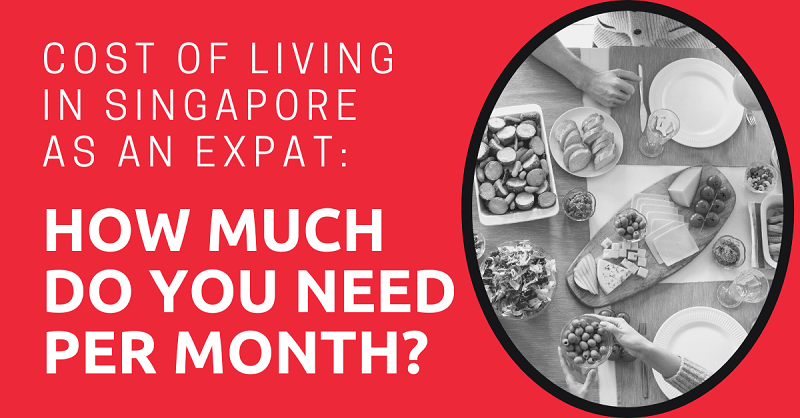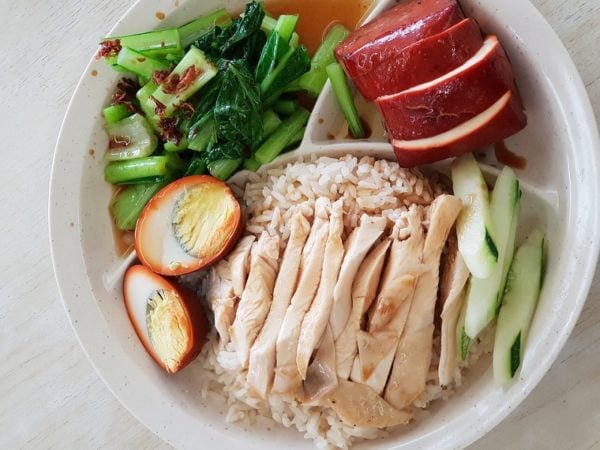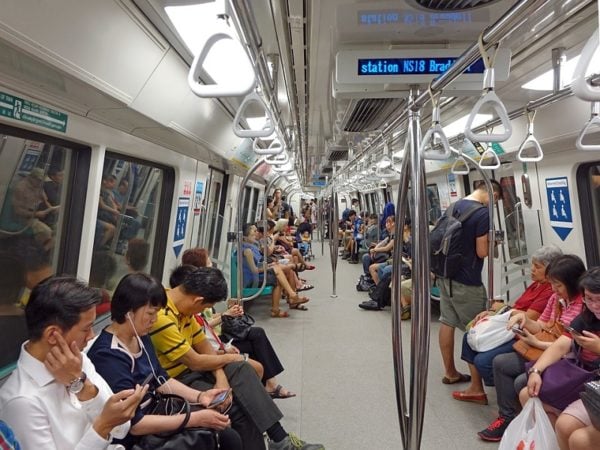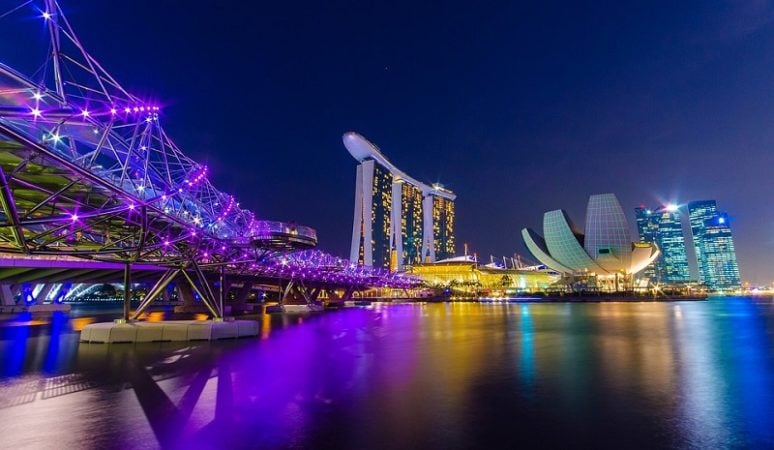
This article will take approximately 24 minutes to read. Don't have the time right now? No worries. Email the ad-free version of the article to yourself and read it later!
According to the Economist Intelligence, Singapore was tied with Zurich, Switzerland, as the world’s most expensive city to live in. In fact, Singapore has been at the top of the list nine times out of the last 11 years. Ouch. But is this really true when living ‘on the ground’?
In this article, we take a look at the essential living costs that you need to consider if you want to live in Singapore as an expat.
Of course, this won’t be the complete picture as there will always be costs that will differ from person-to-person, such as clothing and leisure activities, but this guide should help you understand what your basic living expenditure around food, rent, and transport could look like. Perhaps this will help in your salary negotiations or just to get a picture of how much disposable income you might have once you have settled in.
Please note, all costs outlined are true at the time of writing but they may fluctuate with market changes.
Disclaimer: This article may include links to products or services offered by ExpatDen's partners, which give us commissions when you click on them. Although this may influence how they appear in the text, we only recommend solutions that we would use in your situation. Read more in our Advertising Disclosure.
Contents
Key Takeaways
- It can be expensive to live in Singapore. f you live frugally by having roommates, splitting bills, and shopping locally, you should be able to survive in Singapore with $1,800 SGD a month.
- Those who want a fancier life living in a nice condo may need upwards of $5,000, while a family of four should set aside at least $20,000.
- Things like rent, electricity, water, and alcohol can be very expensive in Singapore, but eating out at hawker centers and taking public transport can help you save money.
- Education, even at a public school, can be very expensive, costing anywhere between $10,000 to $230,000, so moving to Singapore may not be the best option if you have kids unless you’re willing to spend a small fortune.
- Rent is likely to be the highest expense you have but you can lower your costs by living outside of the CBD in areas like Punggol or Pasir Ris.
Living Expenses
There is no doubt that Singapore is very expensive in so many ways, from rent to restaurants or owning a car and more. But there are also plenty of other elements to life here that are surprisingly cheap: taxis, local food, and full-time live-in help, for example.
As with many things in life, much of it is down to the choices you make around the lifestyle you want to keep. Of course, there is no right or wrong way to live, and everyone has different priorities, but this article will guide you as to what costs you need to take into consideration and what range they fall in depending on the choices you make.
Bear in mind that with any expat move, there are always additional set-up costs, from your relocation and shipping to acquiring furniture for your new abode, so don’t forget to factor these in.
You may also have to make some upfront one-off costs or deposits say, putting your child into nursery school or joining a football club. Make sure to make a note of these. Many an expat has forgotten to claim these deposits back several years after making them.
Lastly, don’t forget the rule of thumb, keep track of your monthly expenditure and don’t overspend. Try to keep to budget and you may even be able to make some savings from your time in Singapore.
Rent
In the fourteen years that I have lived in Singapore, rent prices have gone up and down a bit like a yo-yo, but there has been one constant…they are always expensive! On par with New York or London, though, you still get more bang for your buck than in Hong Kong.
Accommodation choices in Singapore are plentiful, from beautiful uber-modern apartments to older-style condominium (condo) blocks, tightly-packed terraced houses to luscious landed properties with swimming pools and relatively speaking huge gardens to iconic heritage ‘shop houses’ and beautiful historic ‘black and white’ homes.
Rental price-wise, it’s not so much which of these options you choose per se, but the location across Singapore, the age of the building, the floor space and level, and the proximity to services and amenities that will have the most bearing on the monthly rental cost.
What will be of most importance to you is likely location, so let’s take a look at average costs across different parts of Singapore using PropertyGuru.
Starting with the CBD and Marina Bay area, for those of you who like to live right in the heart of the city and want minimal commuting time if working in the financial district, a swish, 2-bed 1,000 sq ft apartment will set you back SGD $8,200/month.
If its proximity to the central shopping area that you are after, look at Orchard Road and the Tanglin area. A 2-bed 800 sq ft apartment will come in around SGD $7,100/month.
Heading west to many an expats’ favourite, Bukit Timah, for its proximity to the neighbourhood friendly Holland Village and many international schools, a semi-detached 4-bed house will be SGD $9,800/month.
While if you shoot up to the north of the island to Woodlands, you can score a two-bedroom for $4,400 as it’s Singapore’s least populated and mostly underdeveloped region.
Head north east to Pasir Ris and prices drop down to just SGD $3,800 for a 2-bed, 764 sq ft apartment.
Over towards the East Coast, a stunning 3-bed conservation ‘shop-house’ will set you back SGD $10,200 to $10,800 a month.
What you are probably gathering by now is that it’s all a little bit like comparing oranges to apples and depending on where you want to be and what you want to be in your costs might vary from anything from SGD $2,200/month all the way up to SGD $19,500/month.
For a more detailed idea of areas and costs, I suggest you read my other article The Complete Guide to Renting an Apartment in Singapore.
Importantly, there are some other factors to consider along with the direct rental cost.
If you live in a condo, all of your maintenance and additional costs are likely to have already been factored into your monthly rental price, but if you live in a landed property, you will want contracts for services such as gardening, pest control and even swimming pool maintenance if you are lucky enough to have one of those.
If you live in a condo, all of your maintenance and additional costs are likely to have already been factored into your monthly rental price, but if you live in a landed property, you will want contracts for services such as gardening, pest control and even swimming pool maintenance if you are lucky enough to have one of those.
Expect to pay up to or around SGD $0/month, SGD $950/month and SGD $400/month accordingly for each of these.
Electricity & Water
As a small island, Singapore’s natural resources are extremely limited so utilities such as electricity and water come out comparatively expensive. You will quickly notice this if you decide to live in 24/7 aircon and may well change your living habits after the first monthly electricity bill!
Bills for electricity and water are generally bundled together through the national grid provider, SP Services, but you can shop around through companies such as Geneco. Costs will range between SGD $250/month and SGD $700/month, depending on the size of the property and usage.
TV, Cable & Broadband Internet
These are also generally bundled together with one provider such as Singtel or StarHub, and as with many things in Singapore, there are all sorts of deals and offers available depending on what you decide you want. Singapore is a well-connected, technology-efficient city and so costs are relatively cheap for the speed and amount of data you will receive.
For SGD $150 a month, I received a fibre broadband line for Wi-Fi, a landline connection and a cable set-top box connected to Singtel TV with additional sports channels. If I wanted to add more movie channels, that might cost an additional SGD $18 or so. I mainly watch movies, however, through Netflix, Apple TV + or Amazon Prime and if you want US or European access you’ll want to add a VPN at about SGD $5/month.
You can find cheaper plans ranging from $50 to $60 if you just want Wi-Fi installed.
Phone
The above bundle apparently gives me a landline phone number as well but I wouldn’t know, I haven’t used one of those in many years!
My mobile phone (hand phone to use the going-term here), on the other hand, sets me back around $170/month, which is expensive, but that is because I have a huge amount of 5G data to be able to work on-the-go and which gets shared with three data-sucking, TikTok watching teenagers.
Most post-paid data plans will set you back between SGD $30 and SGD $100 a month. Pay-as-you-go plans, as you would expect, are considerably more expensive and can climb out of control pretty quickly, so if you don’t want post-paid, I suggest a pre-paid SIM-only plan which is sold in bundles of just SGD $10 to $40 depending on how much data you want.
Food
Again, being a small island with limited local food supplies, food and grocery shopping bills can quickly rise, especially if you are drawn to foreign brands. However, as hard as I try, it is rare to leave the supermarket with even one small bag that has cost less than $120. A large weekly shop-in of supplies will set me back $250 to $450.
But this is because I’m generally quite lazy and go for convenience shopping in my local Cold Storage, which is notoriously expensive, as are other shops like Jason’s Marketplace.
If I were to go local and head to Sheng Siong or Giant, I could cut my shopping bills in half, especially when buying essentials such as washing powder or cleaning products. You’ll also spend a lot less, around $120 to $250 a month, if you’re just buying groceries for yourself.

Food-wise, a pack of a dozen local eggs will set me back SGD $4.8 compared to SGD $7.5 if I go for the imported Australian eggs. With only one very small cow farm in Singapore, the milk you buy will be imported and cost around SGD $4.2 for 1L.
If it’s fruit and veg you are after, then the supermarkets will merrily sell you everything in any season…at a price. I’m sometimes horrified to see a punnet of raspberries will set me back over SGD $10.00 when I know in the UK they would be sold for about one British pound. But raspberries aren’t native to Singapore.
Head down to the local wet market, and you can fill your bag with all sorts of delicious local fruits such as mangos, durian and papaya and still see change from SG $25.
Coffee
If you are talking coffee, as in Starbucks Coffee, then a flat white will cost SGD $8.20 regardless of where on the island you buy it but go local and pick up a Kopi (black local coffee with condensed milk) for about $2.00. Many expats quickly become converts. While you are there, try some Kaya toast…sweet and delicious.
Dining Out
Singapore has some fabulous restaurants, even some Michelin-starred ones, but these will burn a hole in your pocket pretty quickly. A main course can be as much as SGD $52 alone and it is rare to come out spending less than $260 for 2 people.
But if dining out is your thing, the good news is that you can eat out every night at a local hawker market and enjoy the most delicious food for under SGD $27 for the two of you. Head to Hawker Chan on Smith Street, and you can still enjoy a Michelin-starred local chicken rice for less than SGD $16.
One of the single biggest expenses when eating out is alcohol, so let’s talk about that.
Alcohol
Why is wine so expensive in Singapore? A regular question on many expats’ lips after the first sip of a pretty average glass of Sauvignon Blanc that has just set them back SGD $23. The short answer is customs duties. The long answer is a little more complicated and hinges around heavy mark ups and an accepting market.
Alcohol is notoriously expensive, but spirits less so than wine, and the price will fluctuate depending on where you purchase it. A bottle of Jacob’s Creek wine that will cost you just GBP 5.50 in the UK will set you back SGD $35 in a Singapore supermarket and double that in a mid-priced restaurant. Even in a BYO restaurant, corkage will be around SGD $32.
Health
Healthcare in Singapore is top notch but depending on your needs, it doesn’t always come cheap.
A GP consultation fee will average SGD $48, while a trip to a specialist will range between SGD $160 and SGD $270 or even more.
A one-night stay in an 8-person, non-air conditioned public ward in NUH will cost just SGD $48, while the deluxe suite in a private hospital will set you back SGD $950 to $1,250.
Once you enter into the realm of procedures, you will be looking at thousands. There is a reason for the slightly sick stock phrase of ‘it is cheaper to die than to fall sick in Singapore”.
Health insurance is the answer and you can look to my other article, Complete Guide to Health Insurance in Singapore for everything you need to know on this.
Gym
Gyms are big business in Singapore and chains like F45 seemed to pop up almost overnight and take over the city. Personally, I prefer to take myself off for a run in the Botanic Gardens or go cycling down one of the many park connector routes that crisscross the island, but if pumping iron and spin classes are your thing, then you won’t be short of options.
Gym memberships vary in price depending on the gym and type of membership you choose.
Virgin Active offers membership plans starting at $38/week to $85/week, while Fitness First comes in at $175/month for full access.
Movies
Regardless of how many on-demand movie channels you have at home, nothing beats the experience of the ‘big screen’. SGD $16 a ticket is the fairly standard price across town but my top tip is head to the more artsy style The Projector where seats cost just $10.50 if you join their fan club or $12.50 for standard tickets.
Transport
Provided you aren’t looking to buy your own car, transport is considered cheap in Singapore.
Rides on the MRT (Mass Rapid Transit System) and public buses are best done using an EZ Link card, a cashless system that you can swipe for public transport and even use in shops such as Seven Eleven.
Tap in and tap-out fares are calculated on journey distance for both trains and buses. You are likely looking at approximately SGD $1.70 to $2.70 to travel from your home to the city, so your monthly return commute of 20 working days will be just SGD $68 to $108, depending on how far you live from work.
If you want to know exactly how much you’ll pay for your commute, you can use the MRT’s fare calculator.

Taxis are also very reasonably priced, with the cost of a journey made up of a combination of a set flag-down or pre-booking price of SGD $4.80 – $5.20 and the journey cost calculated as SGD $0.28 for every 400m travelled. Note, the clock also ticks for waiting time at SGD $0.28 for every 45 seconds.
Surcharges are applied for peak periods such as rush hour, 25% of metered fare, or late night, 50% of metered fare, and you’ll see an additional SGD $7 to $9 on the pick-up charge if coming from either the CBD or Changi airport.
If you are dead set on driving yourself around town, then just be aware that everything about the pricing from buying the car to the COE (Certificate of Entitlement) to road tax and insurance is set to discourage you. All in, you would likely need to set aside up to SGD $110,000. That’s a lot of taxi journeys.
A considerably cheaper option would be to lease a car. AceDrive advertises their starting price at SGD $1,500 per month.
Maid
Many expats in Singapore rely on a domestic helper to ease them through daily life. From keeping your house in tip-top shape to doing the shopping and cooking or helping with young children, there are many reasons why it is very normal to have live-in daily help.
Helpers are fully employed members of your household, and you will have a contract and set salary in place. Depending on their experience and skill level, expect to pay in the region of SGD $800 to SGD $1,600 on a monthly basis. In addition to this, you’ll want to buy an insurance contract to cover personal accident, medical insurance and the government security bond.
This will be in the region of SGD $380 to $520 per year for a two-year contract. In addition, there is a monthly government levy of SGD $320 or $65 with government concessions for elderly people and people with disabilities.
Additional costs include paying for their medical check-ups every six months at around SGD $55/visit, airline tickets home to visit family each year, and an allowance to cover food and toiletries. Some families also set their helper up with a mobile phone contract or add-ons, such as a gym membership.
Last but not least, factor in the “13th month” this is an annual bonus paid either at Christmas or Chinese New Year of the equivalent of a month’s salary.
Laundry
If you have gone the helper route, you are unlikely to be looking at laundry costs as they will be helping you with that, but without a helper, you might be looking at laundry for sheets and shirts. Individual items will cost anywhere between SGD $4 and $30 for dry cleaning or approximately $10 to $18 per kg for wash and fold laundry services.
Education
After rent and cars (if you’ve chosen to buy one), education is likely the next biggest cost you will be facing.
Local schools are known to be cheaper than international schools but are difficult to get into with balloting procedures for limited spaces. If you are lucky enough to secure a slot, expect to pay anywhere between SGD $11,000 and SGD $240,000 a year, depending on whether your children are at the primary or secondary stage.
Alternatively, you will be looking at international schools in Singapore of which there is plenty of choice to suit many budgets and needs. In recent years, a number of smaller, more affordable international schools have arrived in the marketplace, but these will still be more expensive than the local schools.
On average, the cost of international school will range from SGD $14,500 at the cheapest primary level to SGD $52,000 at the most expensive secondary level. If price is a factor, do look around as some schools offer scholarships or discounts to assist families looking for spaces.
In addition to tuition fees, you can expect to pay a registration fee of between SGD $650 and SGD $5,500; an acceptance fee on receipt of a confirmed place of between SGD $1,100 and SGD $5,500, and then for many schools, an annual building development or one-off capital levy fee of between SGD $1,100 and SGD $8,500.
Lastly, don’t forget that bus services, uniform, extra-curricular activities, field trips and technology will all be additional costs. That end-of-year bill won’t be pretty!
Haircut
If your tresses are your shining glory, then you will likely be taking a trip to one of the smarter hair-dressing salons in town which might set you back between SGD $95 and SGD $135 per trip, but if it’s just a quick short back and sides, then go local and pay just SGD $32.
Vacations
Does this count as a necessary cost? In my book, absolutely! After all, one of the biggest draws to expat life in Singapore is the easy access to so many amazing destinations across Asia. As to what you spend on that vacation, how long is a piece of string? The choice is yours.

Budget airlines such as Air Asia and rental sites like Airbnb can make your backpacking days of old come alive again, in a slightly more adult way, while travel agencies such as LightFoot Travel are always on hand to make that once-in-a-lifetime trip a reality. The budget? That’s entirely up to you.
Visa
The cost of securing a work permit to make your expat adventure a reality in Singapore is surprisingly cheap.
There is a SGD $110 application fee to get an employment pass and just SGD $240 to pay for the pass issuance, whether this is the first time you apply or for a renewal, which you will need to do every two or three years. Thankfully, many employers cover this cost for you.
Average Cost of Living by Area of Singapore
Singapore is really such a small island that there aren’t such huge differences in the overall cost of living from one end of the island to the other, so it would be difficult to pull this out exactly for each area. But the big differentiating factors that you might want to take into consideration are your rent and groceries.
In areas such as the CBD, rent costs are high as space is at a premium and convenience is the order of the day for busy working people, so expect to see and pay the price of the higher-end supermarket chains rather than the local food markets.
Cheapest Place to Live
As a follow on from this, it figures that the further away you go from the CBD and central retail area of Orchard Road, the cheaper the cost of living goes in terms of rental costs and being able to shop local and eat local.
At the time of writing, the cheapest area of Singapore is likely up in the North East, around Punggol and Pasir Ris. Some of the more affordable schools, such as Middleton International School, are in this area, housing is cheaper, and the area is dotted with many local eateries and wet markets for your daily shopping.
How Much Do I Need Then?
There is no easy answer to this question as it will depend on the lifestyle choices you want to make so perhaps start with thinking about what is important to you. Is location and distance to work or school important?
Do you want greenery and space, or are you after the urban lifestyle? Will you be working from home more frequently and therefore in need of an additional room as a home office?
How much you need per month isn’t going to change dramatically depending on where in Singapore you live, but rather on how you live, so here’s a rough guide:

Living in Singapore with SGD $1,800 a Month
If you take a single room in a shared house, where you split the bills, only shop and eat local, and use a mobile phone, you should budget for around SGD $1,800 a month.
Living in Singapore with SGD $5,000 a month
If you want a slightly fancier life in a nice condo, you plan on taking taxis and eating out in restaurants, or having some drinks in a bar, then I suggest you will need at least SGD $5,000 a month.
Living in Singapore with SGD $20,000 a month
But if you are here with a family and need space for at least four of you in a house with a pool and a maid to look after you and have busy, active, and hungry children, you will need to start allowing anything upward from SGD $15,000 a month. Add in a car and school fees, and you need to start looking at SGD $20,000 a month and upwards. Singapore living is not cheap.
Now that you have a clearer picture of all the different costs to consider, you should be able to answer these questions and then apportion your costs against your priorities to meet your own budget. Good luck!








